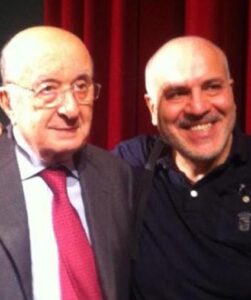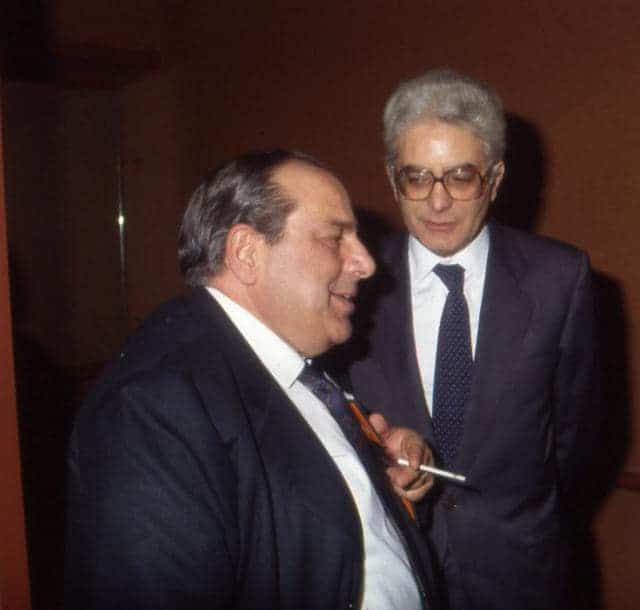by Vincenzo Speziali – Riccardo Misasi is the enlightened among all Christian Democrats. Yes, he was a concentrate of humanity, wisdom, culture, spirituality and oratory. Yes, he was, without a doubt, the greatest orator that our Party – and even that of his other colleagues – there was in the contemporary time. Aldo Moro (Moro, always Moro, only Moro) – of whom Riccardo had absolute veneration and affection – used to speak, in Latin, with Mariano Rumor (leader after Antonio Segni, of the Dorotea current and unique, as Francesco Cossiga confided to me, who culturally, could stand up to the Calabrian Apulian statesman and martyr, that is Moro, to be precise). Few know, indeed very few, that even between the two former Premiers DC (ie Aldo Moro and Mariano Rumor), there was another with whom they argued, from time to time, in the language of Cicero, or the non-macaronic latinorum. It was a continuous lesson in high politics to hear Riccardo argue, to see him reason and mediate, even to listen to his roaring “gubernar no es asfaltar’ (precisely because he had his own profound idea of the management of the state, obviously in a Maritenian key). Equally exhaustive was to observe him in his ‘Labours of Sisyphus’, that is to face the -apparent- character asperities of Ciriaco De Mita (by the way, how much I miss him too, now that he’s gone, even considering that he is Antonia, both his daughter and Maurizio, Riccardo’s son, separately confessed to me the affection and esteem he had for me: Sic Transit Gloria Mundi!). But, returning to Riccardo, I remember him – nostalgically and admired – with his bombastic shouting, like a consummate actor, while he recites a heartfelt oration, which few could do and as only he could. Lillo Mannino, Clemente Mastella, Peppino Gargani, Mariapia Garavaglia, Angelo Sanza and Bruno Tabacci, have always reiterated to me, that the real ‘leader’ of their current, or the one called – within the Christian Democrats – Sinistra di Base, was Riccardo , not Cyriacus. It is partly true, but ours (that is, Misasi), if only he had heard it – although he was aware of it and was conscious of it – rejected this approach, denying with a languid, disdainful and sincere refusal, such a recognition, as if it were the apple that Eve or Snow White should have rejected, or a secular heresy, precisely out of authentic devotion, a true friendship, which she nourished towards Ciriaco and was reciprocated by him.
Ciriaco and Riccardo in the afterlife
I smile, imagining them together again, up there, where they have gone walking again, with Ciriaco who takes him by the arm and says to him “Riccardo, let’s break it”, yes, that’s right, let’s break it, with his unmistakable Nuschese accent “my guriosity : according to you, how will Meloni blagar Berlusgoni?”.
I can already see Riccardo looking at him melting into a sly smile – but in a positive and good way, with the eternal cigarette in his hand, which leaves his mouth (precisely because it helps him concentrate for the answer to give) and says:” My Ciriaco, what do you want me to tell you?”, joining his fingers together and still with the lit cigarette, but continuing his saying with “Probably, he will consult with Guido Crosetto! Do you remember? He was the protégé of Gianni Goria ”. At this point, Ciriaco tells him (again with the Nuschese accent): “Oh yes, I forgot. You are right! On the contrary, call him, he must be gua da gualghe barte”.
Yes Riccardo will smile, with affection, at this point, because of Gianni – poor Gianni (whom I miss him too much, like the others and like Riccardo) – he was a son to Misasi, indeed Goria recognized ours as adoptive father and no one but him. Riccardo loved me so much, he spoke to me about my grandfather of whom he was one of his political disciples and he honored me with a guide from him – even though I was a pupil of Arnaldo Forlani (and the two of them talked, and how!). I’ll reveal a secret: it was Misasi who advised me to study the classics and philosophy a lot and then to train in the art of oratory, which he had glimpsed could exist in me, but which he couldn’t bear if he didn’t have a structured cultural support, certainly not to flaunt, but to complement the soul.

The interview with Maurizio Misasi
Maurizio, therefore, to us: what kind of father and grandfather was he? I know, but I would like it to be you, as a son, to remember and describe it?
Our father was a funny father. He had an enthralling enthusiasm and a curiosity declined to everything that could enrich and amuse him. He taught us the taste for all knowledge, often if not almost always using the mode of play and fun. Abandoning the moment of work he couldn’t wait to be with us children and then even more with his grandchildren to tell us stories often invented by him, or take us on new adventures by climbing mountains, participating in adventurous big fishing or sailing trips and travel. He loved history and taught us to respect it and to draw valuable lessons from it, he always got us used to thinking about things trying to understand their profound meaning. He was very open and always present. He could be severe and sweet at the same time, I think and I can say it, like he should always be a father. He was a father and also a travel companion.
As a politician, that is, Regional Secretary, Deputy, Undersecretary, Minister, President of the Parliamentary Commission, National Party Executive and Head of the National Political Secretariat, he has managed a lot. It was said that if De Mita reigns, Misasi governs: it was true, I am partly a witness, however and I also want to confirm that your father had no conceit or covetousness, on the contrary he did everything possible not to attract attention. He loved politics, but it left a mark over time, a beautiful and indelible mark. Do you agree?
When dad died, Ciriaco de Mita said perhaps the truest and most beautiful thing about him: Misasi was so political that he didn’t appear so. It is true. Everything about him was political. His every intuition, every reflection and action were always immersed in such a profound dimension of intelligence of times and phenomena that, inevitably, that natural relational dimension of Man always surfaced, the same one that makes Aristotle say that man is ” a political animal”. Whoever relates everything makes politics because it reveals the connections of history. He also had a profound sense of friendship loyalty. Who can be friends. In my opinion, he does politics because he creates communion and therefore community. Yes, without this appearing to be a form of personal pride, I think dad left a mark not only in the society and history of this country but above all in every person he met.
We are talking about a dramatic moment, that is the story of our poor president Moro. You too – like everyone else! – You know how devoted I am to the President and I will always be on the right side, that is, his: we talked about it together countless times, even with Maria Fida. I know perfectly well – even as a scholar of this page (especially of it!), but also of many other stories – I said I know well, also because we often discussed it, with your father, what suffering he felt, on this occasion. Do you want to remember his emotions and how much he tried to do (i.e. a lot, like few others, i.e. only Fanfani and Craxi, as well as St. Paul VI)? Give a backstory, if you feel like it. It’s for a noble reason. Believe me!
That story touched and deeply marked my father. The link with Moro was not only one of political and personal esteem, it was something more. There was in him the conviction that Moro was the only possible resource for the safeguarding of Italian democracy. This prompted him to do everything to save his life during the days of the kidnapping, not only for convinced reasons of a humanitarian or principled nature; that is, the conviction that an icy and cynical reason of State could not be opposed to the reasons of Man, but rather that Moro was to be saved for reasons, precisely political ones. He felt so much the responsibility to save him that he did everything, even to the point of offering himself as a prisoner in exchange. This heroic generosity of his made me fully understand for the first time the heart and the noble courage of my father. When the first letter written to him by Moro since his imprisonment arrived, a letter which I personally collected, papa had the feeling that Moro was trying to give some indications of things that he perhaps he had understood. There is in fact a superfluous and pleonastic passage in that letter which seems to have been put there to give an indication. I am convinced of it even now but perhaps this is not the place for this study. This induced him even further in his attempts to save his life. In those days I try to talk to whoever he can. Then, the day in which he and Fanfani had decided to make a strong statement in the party leadership convened on May 9, the news of the discovery of Moro’s body was given.
Maurizio, how did you live the years of the false revolution of Tangentopoli? I know many things and we talked about them. Some lived alongside, mainly with you, who for your father and mother – I can say it, as a credible and eyewitness – were the light of their eyes. This, in fact, is a question that cannot have an interpretative variability, yet this variability is acceptable in the answer, as everyone reacts in their own way, when they find themselves in painfully similar situations. Having said that, unfortunately, I know that there were ‘betrayals’ and I know your father faced them with elegant detachment and as a true man of Faith: can you tell us in detail?
Betrayal always took him by surprise and yet he always knew how to get over it and always tried to rebuild the relationship even by tying himself to every possible foothold to rebuild collaborative relationships. He had an ability to understand and forgive that, I confess, often exasperated me. There were people he had trained who were able to betray him repeatedly and he tried to go further with immeasurable patience, convinced that the task of a good politician should always be to save even the smallest shred of good. Once faced with his mercy towards a person who had been petty and unnecessarily cruel towards him, I reacted by accusing him of being too good to a person who did not deserve it. He replied: “Jesus tells us to love our enemies, I have this enemy, let me love him”! I will never forget this example. Charity is a fact and Dad was implementing it. During the tragic farce of the so-called Tangentopoli, we suffered a lot and were literally persecuted and yet I want to remind you that Dad was one of the few leaders who didn’t even receive an indictment. He suffered greatly from the attempts to tarnish his story about him. At that moment his testimony of Faith was an example for all of us.
I described the relationship between Ciriaco and your father: do you want to add something?
It was an extraordinary relationship, they were very different yet it seemed that their intelligences were created to meet. Sometimes they understood each other without even speaking. However, they did not have the same view on everything. One above all the Moro affair. They complemented each other and were interchangeable and complementary. They trusted each other’s intelligence. Dad corrected some rough spots in Ciriaco’s character and vice versa he corrected some excesses, according to him, of my father’s clemency. They were above all one thing: friends. Friendship is what we were created for.
READ ALSO | Portrait of Riccardo Misasi, the best orator in Christian Democrat history
© Reproduction reserved.



